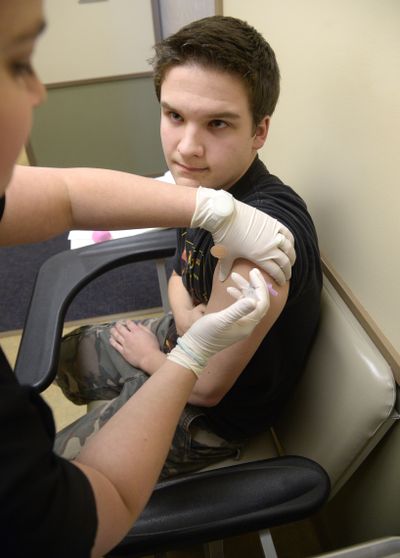Swine flu arrives early in Inland Northwest

The flu arrived early this year and has sickened people across the Inland Northwest as the nasty strain sometimes called swine flu spreads.
About 70 people – most with chronic illness or respiratory issues such as asthma – have been hospitalized in Spokane.
The familiar culprit is the H1N1 influenza that created a pandemic in 2009, said Dr. Joel McCullough, health officer for the Spokane Regional Health District.
Hardest hit so far are children, young adults and people in their 50s and 60s who have not received the flu vaccine.
The H1N1 strain known as swine flu earned notoriety when it swept across the country in summer and fall 2009. College students were bedridden for days, and hospitals filled with young people as health officials scrambled to confront one of the most serious flu outbreaks in decades. In Spokane, the health district held mass vaccination clinics.
“It’s still too early to tell how serious it is” this year, McCullough said.
Dozens of patients are seeking help from clinics across the city. Some want the flu shot; others are seeking relief.
Dr. Ben Hubbard, a physician at Rockwood Urgent Care, said patients with the flu describe the feeling as “I got run over by a bus.”
Patients began arriving when the cold snap following Thanksgiving ended, he said.
The symptoms come on fast: First it’s a sore throat and then a cough that progressively worsens. Fever follows, with headaches and body aches. Many patients also have itchy, burning eyes.
The symptoms can last about five days, Hubbard said. People with the flu should drink plenty of water and can take ibuprofen to ease pain. Some may decide to purchase prescription oseltamivir, an antiviral sold under the brand name Tamiflu.
At least two flu patients with complicating medical conditions have died in Eastern Washington hospitals so far this year.
Hospitals are restricting visitation in hopes of keeping patients safe, said Joe Robb, a spokesman for Providence Sacred Heart Medical Center and Providence Holy Family Hospital.
Most hospitalizations are for people with other health problems worsened by the virus, and many are being admitted into intensive care units.
The best defense is vaccination, said McCullough.
The flu also has spread across North Idaho, said Jeff Lee, an epidemiologist with the Panhandle Health District.
McCullough said about 35 percent of Spokane residents get the flu shot during an average year. While the vaccine does not guarantee immunity from the flu, it will, in most cases, shorten the duration and lessen the severity of the infection.
McCullough noted that some people avoid getting the shot because they fear it will make them sick with the flu.
“That’s simply an old wives’ tale,” he said. “If you get flu right after you get the shot, it’s because you were already infected.”
This year’s influenza vaccine protects against the H1N1 strain, and there’s ample supply.